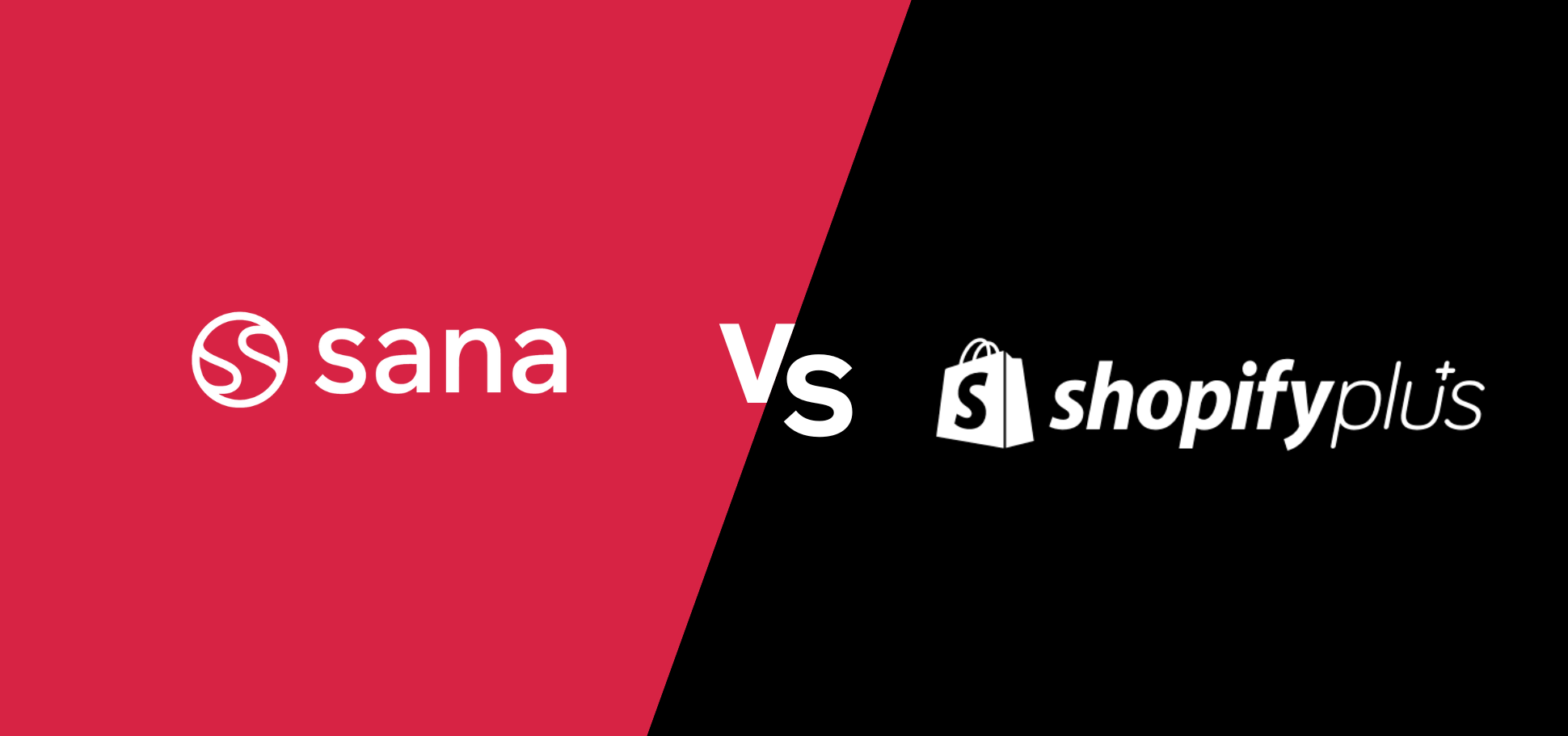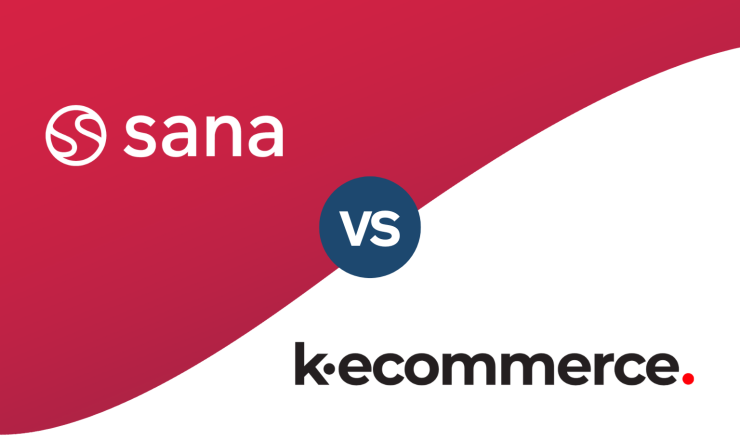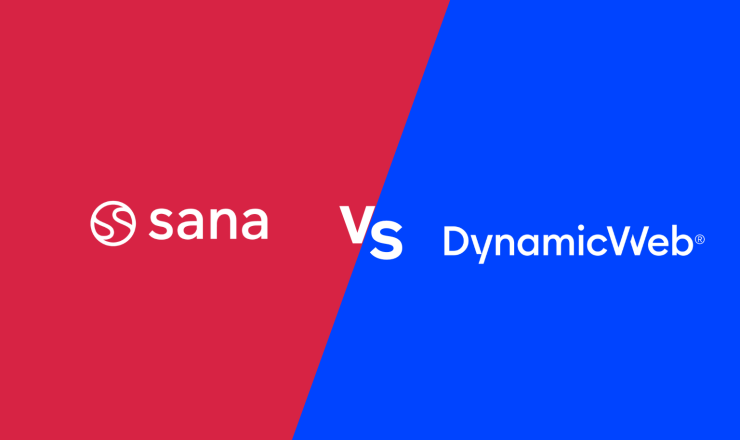

Hunting for the right software vendor for your new (or new-and-improved) web store can be a daunting task. With all the options in the marketplace, it may be challenging to even build a shortlist of potential e-commerce partners, let alone choose the right one for your business needs.
As an e-commerce software vendor, we understand just how saturated the market is. You’ve probably heard about the big e-commerce juggernauts, like Shopify Plus or Adobe Commerce — but bigger doesn’t always mean better. To help with your B2B e-commerce platform comparison, we’ve put together an overview of the considerations when evaluating Sana Commerce vs Shopify Plus.
Shopify Plus: A contender in B2B
Shopify Plus has made waves in the e-commerce world, primarily catering to midsize and large retail and brand clients.
They’ve made efforts to expand into the B2B space, but their core functionalities still lean heavily towards B2C.
While they offer a seemingly simple pricing structure and have made strides with their Microsoft Dynamics 365 Business Central (BC) connector, there are three critical aspects that are worth paying attention to:
- Core B2B functionalities: For true B2B organizations looking for an e-commerce platform that can accommodate their unique needs, Shopify Plus requires additional automations to execute or maintain B2B features like inventory management, customer-specific pricing, or RFQ requests.
- Suitable for complex processes: In a similar vein, if your organization handles a high amount of complexity on a day-to-day basis, whether in an inventory, pricing, or customer level, Shopify Plus struggles to accommodate and streamline for this.
- Personalized pricing and discounts: Do your customers have personalized pricing agreements, that should be displayed in real-time? Shopify Plus does not have the functionality to serve this critical need.
Let’s dive deeper into how Sana Commerce compares to Shopify Plus with regards to these three features:
-
B2B Functionality
When navigating the world of B2B e-commerce, it’s crucial to consider the unique needs of your business. This goes beyond just having an online storefront; it’s about enabling efficient operations and fostering strong customer relationships.
- Real-Time ERP Integration: Maintaining accurate, up-to-date product information, inventory levels, and customer-specific pricing is paramount. A seamless, real-time integration with your ERP system ensures that your online store reflects the most current data, minimizing errors and enhancing the customer experience. While Shopify Plus does offer integration with some ERP systems, real-time synchronization may be limited, potentially requiring manual updates and leading to discrepancies.
- Efficient quote and order management: The RFQ process is a cornerstone of B2B sales. Enabling online quote requests, negotiation, and seamless conversion to orders can drastically improve efficiency and responsiveness. Shopify Plus’ built-in RFQ capabilities might be limited, potentially necessitating workarounds or third-party integrations.
Complex Processes
B2B operations are inherently complex, with intricate workflows involving multiple stakeholders, diverse product catalogs, and customized pricing structures. When evaluating e-commerce platforms, it’s vital to consider how well they can handle these complexities.
- Sophisticated account management: B2B businesses often deal with complex account structures. The ability to create hierarchical accounts, assign granular permissions, and streamline approval workflows can significantly simplify your sales process. Shopify Plus does provide some account management features, but its capabilities may not be as robust as those offered by dedicated B2B platforms.
- Subscription-based models: For businesses offering subscription-based products or services, the ability to manage recurring orders, automated billing, and customizable terms is essential. While Shopify Plus offers a basic subscription feature, it might lack the depth and flexibility required for complex B2B subscription models. With no in-depth discount management systems, flexible discount codes, or advanced analytics, there are limits to the customization capabilities of this feature.
Sana Commerce Cloud, designed specifically for B2B, is built to streamline these complex workflows. Its deep integration with your ERP system ensures real-time synchronization of data, minimizing manual intervention and ensuring accuracy across all touchpoints. Whether it’s managing multiple price lists, handling intricate order processes, or providing personalized customer experiences, SCC aims to simplify the complexities inherent to B2B e-commerce.
If your business deals with large product catalogs, diverse customer segments, and complex pricing structures, it’s worth considering how a B2B-focused platform like Sana Commerce Cloud can help you optimize your operations and reduce manual effort.
-
Pricing & Discounts
In B2B commerce, pricing isn’t just about listing a product’s cost; it’s a strategic tool. You need the flexibility to offer personalized pricing, volume discounts, and promotions tailored to specific customers or customer groups.
- Flexible pricing and promotions: B2B pricing isn’t one-size-fits-all. Your platform should allow for personalized pricing, volume discounts, and targeted promotions based on various criteria, all managed seamlessly within your ERP system. Shopify Plus may require additional apps or customizations to achieve the level of pricing flexibility needed for complex B2B scenarios.
Sana Commerce Cloud recognizes the nuances of B2B pricing. With its seamless integration into your ERP system, you can manage complex pricing structures directly within your familiar environment. This allows for real-time price updates, personalized discounts, and targeted promotions that are automatically reflected in your online store.
If your business relies on intricate pricing strategies to drive sales and maintain customer relationships, it’s worth considering how a B2B-focused platform like Sana Commerce Cloud can help you streamline pricing management and provide a more personalized experience for your customers.

Compare solutions side-by-side
See how different e-commerce solutions stack up and decided which software works best for your business.
Sana Commerce vs Shopify Plus: Questions to consider
As you evaluate your options, consider these questions:
- Which B2B capabilities are essential for your web store?
- Do you need to automate recurring orders for your buyers?
- How important is real-time data synchronization for inventory and pricing to your workflow?
Understanding Shopify’s limitations in context
Let’s talk scenarios. Imagine you’re a manufacturer dealing with thousands of SKUs, each with specific pricing for different clients. Shopify Plus might struggle to keep up with the constant updates, leading to mismatched inventory levels or incorrect pricing displayed to your customers. With SCC, these updates happen in real-time, ensuring your online store always reflects the accurate data from your ERP.
Consider a scenario where your B2B customers place large, recurring orders with specific payment terms. Do you want to manually process these orders or deal with inflexible subscription options? SCC automates this process, allowing your customers to place repeat orders effortlessly, freeing up your team for more strategic tasks.
Perhaps you’re dealing with complex sales agreements that include volume discounts and tailored terms for different accounts. Shopify Plus might require workarounds or third-party apps to handle these complexities, whereas SCC integrates seamlessly with your ERP, ensuring these agreements are reflected accurately in your online store.
These are just a few examples of how Sana Commerce Cloud addresses the unique challenges B2B businesses face daily. It’s not just about features; it’s about empowering your business to operate efficiently and provide a superior customer experience.
Red-flag language: questions to ask in demo calls
When you’re in the middle of evaluating software, you want to watch out for providers who might be promising more than they can deliver.
Here are some important questions that can help you stay on top of your priorities, and ensure you’re able to create a highly functional web store that accelerates your B2B organization:
Question #1: What are your B2B-specific functionalities?
Shopify Plus lacks some of the basic B2B functionalities so critical to web stores, such as advanced customer self-service functionalities.
To compensate for these limitations, their customers end up relying on third-party applications, potentially incurring unforeseen costs and exposing themselves more widely.
Sana Commerce Cloud has been engineered for B2B, and includes built-in functionality such as:
- RFQ (Request for Quote) processes
- RMA (Return merchandise authorization) systems
- Structured account hierarchies, including sub-user account management
- Tailored pricing specific to each customer
Question #2: What functionality do you offer to enable web store revenue?
To encourage cross-sell, up-sell, and recurring revenue, your commerce software needs functionality that goes beyond the basics. Shopify’s subscription service offers a straightforward solution, but it might be too rigid for the diverse needs of B2B operations.
Designed with small businesses in mind, Shopify provides essential subscription functionalities. However, it falls short in delivering comprehensive features like:
- In-depth discount management systems: B2B often requires complex discounts and promotions tailored to specific customer segments or order volumes.
- Advanced analytics to track and optimize subscription models: Understanding customer behavior and subscription performance is key to refining your strategy, but Shopify’s analytics may lack the depth needed for B2B.
- Flexible discount codes and incentives for bulk orders: Incentivizing larger purchases is common in B2B, but Shopify might not offer the granular control you need over discounts.
Customers have reported that Shopify’s subscription app can be limiting in terms of customization and flexibility, with common pain points including:
- Inadequate display and formatting capabilities: B2B subscription offerings might need specific presentation tailored to different customer groups.
- Insufficient advanced customization options for unique business needs: One-size-fits-all solutions rarely meet the nuanced requirements of B2B buyers.
These limitations suggest that Shopify’s approach might not be compatible with the intricate requirements of B2B buyers. Businesses seeking to offer a nuanced subscription service to their clients, with varying tiers, discounts, and access levels, may find Shopify’s current offerings inadequate for their sophisticated subscription management needs.
Question #3: How deeply integrated is your platform, and how much time can I expect data-syncs to take?
In the B2B world, real-time, bi-directional data synchronization across platforms is a necessity. It maintains accurate inventory, pricing, and customer data, minimizing errors, saving time, and enhancing customer satisfaction. Delays or inaccuracies can disrupt operations, leading to missed opportunities and frustrated customers.
Shopify Plus, while a strong contender in e-commerce, may not fully meet the high demands of real-time data syncing for B2B transactions. For businesses requiring instant updates across ERP, CRM, and e-commerce platforms, Shopify Plus might fall short, potentially causing:
- Delayed order processing due to sync lags: Slow synchronization can lead to inaccurate inventory levels and delays in fulfilling orders, impacting customer satisfaction.
- Mismanagement of inventory levels: Inaccurate inventory data can result in overselling or stockouts, disrupting your supply chain and causing lost sales.
- Pricing discrepancies: Outdated pricing information can lead to customer confusion, incorrect invoices, and potentially lost revenue.
These issues can significantly hinder B2B operations where timing and accuracy are paramount. Exploring platforms that offer comprehensive, real-time ERP integrations could drastically reduce manual workload and error risk, ensuring your business operates at its full potential.
Sana Commerce Cloud, for example, is designed for seamless, real-time integration with your ERP system. This means that changes made in either system are instantly reflected in the other, eliminating the need for manual updates and minimizing the risk of errors. Whether it’s inventory levels, pricing, or customer data, you can trust that your information is always up-to-date and accurate.
Sana Commerce vs Shopify Plus: Choosing the right path for your B2B growth
Selecting the right e-commerce platform is a pivotal decision for your B2B business. While Shopify Plus has made strides in the e-commerce world, its B2B capabilities might not fully align with the specific needs and complexities of your operations. Sana Commerce Cloud, on the other hand, is purpose-built for B2B, offering robust features, seamless ERP integration, and the flexibility to handle complex pricing and workflows.
By asking the right questions during demo calls and understanding the nuances of each platform, you can make an informed decision that sets your business up for success. Remember, the ideal platform isn’t just about features—it’s about finding a partner that understands your unique challenges and empowers you to achieve your business goals.
If you’re seeking a B2B e-commerce platform that can truly adapt to your business, streamline your operations, and enhance your customer experience, Sana Commerce Cloud could be the perfect fit.

Ready to see how Sana Commerce Cloud can transform your web store?
Speak to a consultant now.


